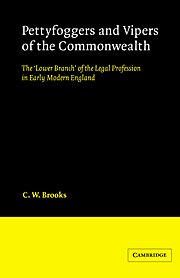 Pettyfoggers and Vipers of the Commonwealth
Pettyfoggers and Vipers of the Commonwealth Published online by Cambridge University Press: 28 October 2009
The early centralization of royal justice and the concentration of the main courts of the realm in the capital city were features of the English legal system which were unique in Europe. Consequently, an account of the English legal profession must inevitably start in London. But having begun in London, it cannot stop there. The royal courts heard cases from every part of the realm. Many of the litigants for whom members of the lower branch acted lived in the country. Most of the lawyers themselves led double lives, one part consisting of residence and private practice in the provinces and the other of termly trips to London for the sittings of the royal courts. The history of the lower branch must, therefore, be written within these same geographical contours.
As the sixteenth century wore on, there was a tendency for practitioners such as the six clerks in Chancery or the officials in the court of Wards, men who were concerned mostly with issuing procedural writs, to dwell full-time in the City. But this was by no means common during the early Elizabethan years. As late as 1589, at least twelve of twenty-two officials of the court of Common Pleas had a principal residence in the country, and so too did all of the six clerks in Chancery. If, even for the major office holders, work in London was mainly a term-time affair, this was all the more true for those practitioners such as the attorneys of King's Bench and Common Pleas, whose main function within the legal system was to act as links between men in the country and the royal courts.
To save this book to your Kindle, first ensure [email protected] is added to your Approved Personal Document E-mail List under your Personal Document Settings on the Manage Your Content and Devices page of your Amazon account. Then enter the ‘name’ part of your Kindle email address below. Find out more about saving to your Kindle.
Note you can select to save to either the @free.kindle.com or @kindle.com variations. ‘@free.kindle.com’ emails are free but can only be saved to your device when it is connected to wi-fi. ‘@kindle.com’ emails can be delivered even when you are not connected to wi-fi, but note that service fees apply.
Find out more about the Kindle Personal Document Service.
To save content items to your account, please confirm that you agree to abide by our usage policies. If this is the first time you use this feature, you will be asked to authorise Cambridge Core to connect with your account. Find out more about saving content to Dropbox.
To save content items to your account, please confirm that you agree to abide by our usage policies. If this is the first time you use this feature, you will be asked to authorise Cambridge Core to connect with your account. Find out more about saving content to Google Drive.